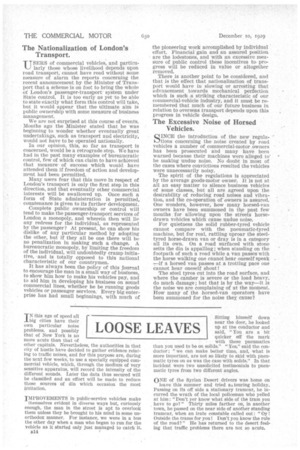The Nationalization of London's Transport.
Page 50

If you've noticed an error in this article please click here to report it so we can fix it.
T TSERS of commercial vehicles, and particu larly those whose livelihood depends upon road transport, cannot have read without some measure of alarm the reports concerning the recent announcement by the Minister of Transport that a scheme is on foot to bring the whole of London's passenger-transport system under State control. It is too early as yet to be able to state eiactly what form this control will take, but it would appear that the ultimate aim is public ownership with some measure of business management.
We are not surprised at this course of events. Months ago the Minister stated that he was beginning to wonder whether eventually great undertakings, such as transport and electricity, would not have to be operated nationally.
In our opinion, this, so far as transport Is concerned, would be a retrograde step. We have had in the past many examples of bureaucratic control, few of which can claim to have achieved that measure of success which would have attended them if freedom of action and development had been permitted.
Many users fear that this move in respect of London's transport is only the first step in this direction, and that eventually other commercial interests will be swallowed up. Once such a form of State administration is permitted, , countenance is given to its further development. Complete public ownership or control will tend to make the passenger-transport services of London a monopoly, and wherein then will lie any redress for the individual, as represented by the passenger? At present, he can show his dislike of any particular method by adopting the other, but if they all be one there will he no penalization in making such a change. A bureaucratic monopoly, by limiting the freedom of the individual, will undoubtedly cramp Initiative, and is totally ppposed to this national characteristic of our countrymen. It has always been the policy of this journal to encourage the man in a small way of business, to show him how to make his vehicles pay, and to aid him in developing his business on sound commercial lines, whether he be running goods vehicles or passenger services. Every big enterprise has had small beginnings, with much of the pioneering work accomplished by individual effort. Financial gain and an assured position are the lodestones, and with an excessive measure of public control these incentives to progress will be reduced in value or altogether removed.
There is another point to be considered, and that is the effect that nationalization of transport would have in slowing or arresting that advancement towards mechanical perfection which Is such .a striking characteristic of our commercial-vehicle industry, and it must be remembered that much of our future business in relation to overseas transport depends upon this progress in vehicle design.
The Excessive Noise of Horsed • Vehicles.
• Q INCE the introduction of the new regulalOtions concerning the noise created by road vehicles a number of commercial-motor owners has been prosecuted and many have been warned because their machines were alleged to be making undue noise. No doubt in most of the cases where convictions resulted the vehicles were unnecessarily noisy.
The spirit of the regulations is appreciated by the average goods-motor owner. It is not at all an easy matter to silence business vehicles of some classes, but all are agreed upon the desirability of reducing road noises and vibration, and the co-operation of owners is assured. One wonders, however, how many horsed-van owners have been summoned in the past few months for allowing upon the streets horsedrawn vehicles which cause undue noise.
• For quietness the solid rubber-tyred vehicle cannot compare with the pneumatic-tyred machine, but for real, rattling uproar the steeltyred horse-drawn van or dray is in a category all its own. On a road surfaced with stone setts the din is appalling ; when standing on the footpath of such a road while a van passes with the horse walking one cannot hear oneself speak —if a horsed van passes at a trotting pace one Cannot hear oneself shout !
The steel tyres cut into the road surface, and where the camber is severe or the load heavy, do much damage ; but that is by the way—it .is the noise we are complaining of at the moment. How many of the horsed-van operators have been summoned for the noise they cause?
























































































































